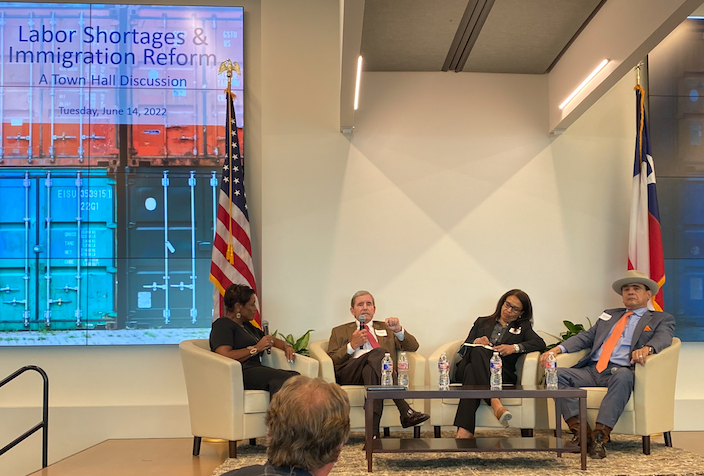Texas Worker Misclassification Bill Could Decrease Illegal Immigration
 A bill aimed at cracking down on companies that intentionally misclassify workers as independent contractors rather than employees could help reduce the numbers of unlawful workers in Texas. Companies use worker misclassification as a tool to cheat the system and create an unfair competitive advantage over companies that properly classify their workers as employees. The misclassification also allows companies to cheat workers out of overtime pay and benefits. Additionally, companies frequently use worker misclassification as a tool to work people not legally eligible to work in the United States.
A bill aimed at cracking down on companies that intentionally misclassify workers as independent contractors rather than employees could help reduce the numbers of unlawful workers in Texas. Companies use worker misclassification as a tool to cheat the system and create an unfair competitive advantage over companies that properly classify their workers as employees. The misclassification also allows companies to cheat workers out of overtime pay and benefits. Additionally, companies frequently use worker misclassification as a tool to work people not legally eligible to work in the United States.
The Texas Workforce Commission estimates that about 35,000 workers were misclassified in Texas from 2010 to 2012, according to an article in the Texas Tribune. These numbers include about 4,300 in the construction industry and 4,100 in health care and social assistance industries. These companies that cheated the system deprived the State of Texas of about $2.4 million in unemployment insurance taxes. When companies lay off these workers, the workers are not eligible to receive unemployment benefits.
Companies will also use the practice of misclassification to get around employment laws regarding illegal immigrants. Companies that improperly utilize their workers as independent contractors are not subject to e-verify requirements in certain contracts.
They also do not withhold income and social security taxes on the workers which increases their unfair competitive advantages over companies that obey the law.
Improperly misclassifying workers is already against the law in Texas, but the penalties are slight. State Representative Senfronia Thompson (D-Houston) has introduced a bill (HB 434) that would increase the fine on construction employers to $100 for each worker and would raise the fine on repeat offenses to $1,000 per worker. “We’ve actually had some resistance, but we’ve also had some very positive meetings with some of the larger builders,” Brete Anderson, Thompson’s legislative director, said to the Tribune. “They have concerns, and we’re going to try to work with them.” The bill has been referred to the Business and Industry Committee.
A similar bill was introduced by State Rep. John Davis (R-Houston) in 2013 but backroom deals from some of the state’s top homebuilders kept the bill from getting to the floor for a vote.
State Senator Jose Rodriguez (D-El Paso) has introduced a bill in the Texas Senate (SB 927) that proposes changes for all industries. The bill would make a legal assumption that all workers are employees unless they are reported to the Texas Workforce Commission as independent contractors. Lt. Governor Dan Patrick referred this bill to the Natural Resources and Economic Development Committee on March 9.
Many in the construction industry support this type of legislation as it creates a level playing field for all businesses. In an article in Construction Citizen, Stan Marek, President and CEO of the Marek Family of Companies, wrote:
In our industry, as in others, many companies “misclassify” their employees, which means they pretend their workers are “independent subcontractors” when by law they meet the definition of an employee. This practice allows those companies to get a pass on all the obligations of an employer, most of which protect the worker. Without employees, there are no minimum wage and overtime laws to abide by. There are no benefits like medical insurance, vacation and paid holidays. There is no workers’ compensation insurance or OSHA jurisdiction to protect the worker. Taxes on labor are not withheld and sent to our federal government. The unemployment trust fund in Texas is dwindling as a direct result. And now that the Affordable Care Act is the law of the land, its employer mandates give companies even more incentive to unload their workers into the underground economy.
As taxpayers, we all suffer while the working man and woman takes the brunt of it.
A bipartisan Texas House Committee report recently said “A misclassifying employer compromises free markets through unfair competition and promulgates lawlessness.” The panel noted that the Texas Workforce Commission found more than 60,000 workers had been misclassified in 2013, resulting in $8.6 million in unpaid taxes. I believe those numbers are just the tip of the iceberg. Keep in mind that the Workforce Commission can only identify a portion of what’s really happening because the agency has limited resources.
It is already illegal to misclassify employees, but companies do it anyway because government enforcement and self-policing by the industry are sorely missing. The elephant in the room is that many of these same workers lack legal status. Most began working under a traditional employer-employee relationship. But as immigration enforcement actions, which came as raids under President Bush and now I-9 audits under President Obama, removed them from the rolls of legitimate employers, they migrated to the independent contractor model.
Legislators will continue to work with businesses and concerned activists for workers and ethical businesses to try and resolve differences that have kept this legislation from passing in prior sessions.








